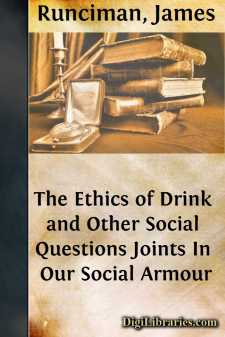Non-Classifiable
- Non-Classifiable 1768
Non-Classifiable Books
Sort by:
Practical Illustration of "Woman's Right to Labor" It never happens that a true and forcible word is spoken for women, that, however faithless and unbelieving women themselves may be, some noble men do not with heart and hand attempt to give it efficiency. If women themselves are hard upon their own sex, men are never so in earnest. They realize more profoundly than women the depth of...
more...
PREFACE A book should be judged somewhat in view of what it attempts. One of the chief objects of this little volume is to lure men and women back to their original calling, that of gardening. I am decidedly under the impression that Eve helped Adam, especially as the sun declined. I am sure that they had small fruits for breakfast, dinner and supper, and would not be at all surprised if they ate some...
more...
by:
James Runciman
THE ETHICS OF THE DRINK QUESTION. All the statistics and formal statements published about drink are no doubt impressive enough to those who have the eye for that kind of thing; but, to most of us, the word "million" means nothing at all, and thus when we look at figures, and find that a terrific number of gallons are swallowed, and that an equally terrific amount in millions sterling is spent,...
more...
CHAPTER 1. It is worse than useless to deplore the irremediable; yet no man, probably, has failed to mourn the fate of mighty poets, whose dawning gave the promise of a glorious day, but who passed from earth while yet the light that shone in them was crescent. That the world should know Marlowe and Giorgione, Raphael and Mozart, only by the products of their early manhood, is indeed a cause for...
more...
by:
John Barrow
CHAPTER I OTAHEITE The gentle island, and the genial soil,The friendly hearts, the feasts without a toil,The courteous manners but from nature caught,The wealth unhoarded, and the love unbougnt, The bread-tree, which, without the ploughshare, yieldsThe unreap'd harvest of unfurrow'd fields,And bakes its unadulterated loavesWithout a furnace in unpurchased groves,And flings off famine from its...
more...
The First Home in the Metropolis. We had never lived in New York. This fact will develop anyway, as I proceed, but somehow it seems fairer to everybody to state it in the first sentence and have it over with. Still, we had heard of flats in a vague way, and as we drew near the Metropolis the Little Woman bought papers of the train boy and began to read advertisements under the head of "Flats and...
more...
CHAPTER I. BOY WITH AN IDEA. Men who do great things are men we all like to read about. This is the story of Christopher Columbus, the man who discovered America. He lived four hundred years ago. When he was a little boy he lived in Genoa. It was a beautiful city in the northwestern part of the country called Italy. The mountains were behind it; the sea was in front of it, and it was so beautiful a...
more...
PHILOSOPHY AMONG THE GREEKS AND ROMANS. Among the Greeks and Romans of the classical age philosophy occupied the place taken by religion among ourselves. Their appeal was to reason not to revelation. To what, asks Cicero in his Offices, are we to look for training in virtue, if not to philosophy? Now, if truth is believed to rest upon authority it is natural that it should be impressed upon the mind...
more...
by:
Anonymous
THE DOG OF ST. BERNARD. St. Bernard is the name of one of the high mountains of the Alps. The deep snow hangs so loosely on the sides of these mountains, that great masses often fall into the plains below, with a noise like thunder. Wild snow storms also come on, and the passes in the mountains become so blocked up and covered over, that it is impossible to find them out. In this way many travelers...
more...
The Coming War While the guns roar from the North Sea to the Mediterranean, and the greatest armed host that history has ever known is still locked in a life-and-death struggle on a dozen fronts, another war, more potent and permanent perhaps than the one which now engulfs Europe, lurks beyond the distant horizon of peace. Its fighting line will be the boundaries of all human needs; its dynamic purpose...
more...











